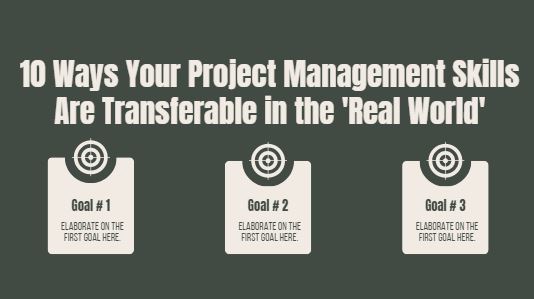
Introduction: The Universal Value of Project Management Skills
Have you ever wondered how the skills you’re developing in your project management career could benefit you beyond the workplace? Whether pursuing a PGDM in project management, considering a distance PGDM, or looking for the best course to brighten your career’s future, the skills you’re acquiring are more versatile than you might think. Project management isn’t just about delivering projects on time and within budget; it’s about developing a mindset and a toolkit that can be applied to various aspects of life.
Explore ten ways your project management skills are transferable to the ‘real world.’ Whether you’re a seasoned professional or a student just starting your journey, you’ll discover how these skills can enhance your personal life and open up new opportunities.
1. Organizing Family Events: From Weddings to Reunions
Planning and Coordination
Remember that complex project timeline you created for work? Well, planning a family wedding or reunion isn’t all that different. Your ability to break down large tasks into manageable chunks is invaluable when coordinating vendors, managing guest lists, and ensuring everything runs smoothly on the big day.
Budgeting Skills
As you manage project budgets, you can apply these skills to keep family events within financial constraints. From negotiating with suppliers to tracking expenses, your project management experience ensures that the event is memorable and cost-effective.
“Planning a family event is like managing a project with stakeholders who are much more emotionally invested.”
2. Home Renovation: Your Personal Construction Project
Scope Management
When tackling a home renovation, defining and managing scope is crucial. Just as in a work project, you’ll need to clearly outline what’s included (and what’s not) to avoid scope creep and keep your renovation on track.
Risk Management
Every renovation has risks, from unexpected structural issues to delays in material delivery. Your experience in identifying and mitigating risks in professional projects can help you anticipate and plan for potential problems in your home improvement endeavors.
3. Personal Finance: Budgeting and Goal Setting
Financial Planning
Project managers are experts at creating and managing budgets. Apply these skills to your finances by:
- Creating a detailed household budget
- Tracking expenses meticulously
- Forecasting future financial needs
Goal Setting and Milestones
As you set project milestones, you can break down long-term financial goals (like saving for a house or retirement) into smaller, achievable targets. This makes large financial objectives less daunting and more manageable.
4. Time Management in Daily Life
Prioritization
Your ability to prioritize project tasks directly translates to managing your daily to-do list. Use techniques like the Eisenhower Matrix to focus on what’s truly important in your life.
Efficient Scheduling
Apply your scheduling skills to balance work, family, and personal time more effectively. Create a personal “project schedule” for your week to ensure you allocate time to all essential areas of your life.
5. Effective Communication in Relationships
Clear and Concise Communication
Project managers excel at conveying complex information. Use this skill in your relationships to:
- Express your needs and feelings effectively
- Avoid misunderstandings through clear communication
- Provide constructive feedback to friends and family
Active Listening
Your active listening skills with project stakeholders are equally valuable in personal conversations. Practice giving your full attention to loved ones, asking clarifying questions, and showing empathy.
6. Volunteer Work: Leading Community Projects
Leadership and Team Management
Your experience leading project teams makes you an ideal candidate for organizing and managing volunteer efforts. Whether it’s a local cleanup drive or a fundraising event, your skills in motivating and coordinating people are invaluable.
Resource Allocation
As you manage resources in professional projects, you can efficiently allocate volunteers, materials, and time to community initiatives. This ensures that community projects make the most of limited resources.
7. Travel Planning: Your Next Adventure Project
Itinerary Development
Treat your next vacation like a project by creating a detailed itinerary. Use your planning skills to:
- Research and select destinations
- Schedule activities and transportation
- Create contingency plans for potential travel disruptions
Stakeholder Management
In travel planning, your family or travel companions are your stakeholders. Use your stakeholder management skills to:
- Gather and incorporate everyone’s preferences
- Manage expectations about the trip
- Resolve conflicts that may arise during planning or travel
8. Career Development: Managing Your Professional Growth
Goal Setting and Career Planning
Apply project management principles to your career development:
- Set clear, measurable career goals
- Create a timeline for achieving these goals
- Identify the resources and skills needed to reach your objectives
Continuous Learning
Just as you conduct project post-mortems, regularly review your career progress. Identify improvement areas and seek learning opportunities, whether through formal education like a distance PGDM or on-the-job experiences.
9. Health and Fitness: Your Wellness Project
Setting and Tracking Goals
Approach your health and fitness like a long-term project:
- Set specific, measurable health goals
- Create a timeline for achieving these goals
- Track progress regularly and adjust your plan as needed
Habit Formation
Use your project management skills to develop healthy habits:
- Break down significant health goals into more minor, daily actions
- Create a “habit tracker” to monitor your progress
- Celebrate small wins to maintain motivation
10. Conflict Resolution in Personal Life
Negotiation Skills
The negotiation skills you use to resolve project conflicts are equally valuable in personal disagreements:
- Seek win-win solutions in personal conflicts
- Use active listening to understand all perspectives
- Find compromise and common ground in disagreements
Problem-Solving Approach
Apply your structured problem-solving approach to personal issues:
- Clearly define the problem
- Brainstorm potential solutions
- Evaluate options objectively
- Implement and monitor the chosen solution
Conclusion: The Universal Value of Project Management Skills
As we’ve explored, the skills you develop as a project manager extend far beyond the workplace. Whether you’re pursuing a post graduate diploma in project management, considering an online PGDM, or looking for the best course to brighten your career’s future, remember that you’re not just learning how to manage projects – you’re developing a versatile skill set that can enhance every aspect of your life.
From organizing family events to managing your finances, from planning adventures to leading community initiatives, your project management skills are valuable in navigating life’s challenges and opportunities. By recognizing and applying these skills in your personal life, you can achieve greater efficiency, better outcomes, and a more balanced and fulfilling lifestyle.
So, the next time you face a personal challenge or goal, take a step back and consider: How can your project management skills help you tackle this? You might be surprised at how often the answer is, “In more ways than you think!”
Remember, whether in your professional or personal life, effective project management is about bringing order to chaos, turning visions into reality, and achieving goals through careful planning and execution. Embrace these skills, continue developing them, and watch as they open up new possibilities.


